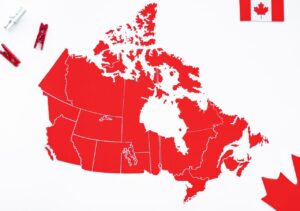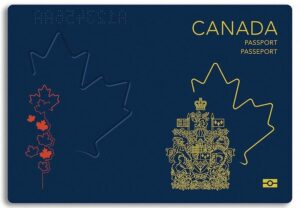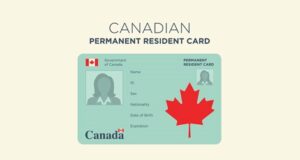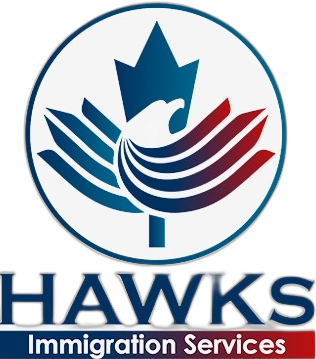Express Entry
Express Entry is a streamlined and efficient system for managing applications to immigrate to Canada. It is designed to attract skilled workers from around the world and help them become permanent residents of Canada. Here’s how it works:

- Eligibility Assessment: Potential candidates are first assessed to determine if they meet the minimum requirements for one of the federal immigration programs, which include the Federal Skilled Worker Program, the Federal Skilled Trades Program, and the Canadian Experience Class.
- Comprehensive Ranking System (CRS): Eligible candidates are ranked in the Express Entry pool based on factors like age, education, work experience, language proficiency, and more. The highest-scoring candidates receive an Invitation to Apply (ITA) for permanent residency.
- Invitation to Apply (ITA): Those who receive an ITA can then submit a complete application for permanent residence within 60 days. This invitation is based on their CRS score and the specific needs of Canada’s provinces and territories.
- Regular Draws: The Canadian government conducts regular draws from the Express Entry pool, issuing ITAs to candidates with the highest CRS scores. This ensures a fair and efficient selection process.
- Permanent Residency: Successful applicants who receive permanent residency can live and work anywhere in Canada and enjoy the benefits of being a Canadian permanent resident, including access to healthcare and social services.
Express Entry simplifies and expedites the immigration process, making it an attractive option for skilled individuals looking to call Canada home. Whether you’re a skilled worker, tradesperson, or international graduate, Express Entry offers a clear pathway to Canadian permanent residency. Start your journey today!
Provincial Nominee Program (PNP)

The Provincial Nominee Program (PNP) is a vital component of Canada’s immigration system that empowers individual provinces and territories to nominate candidates for permanent residency based on their unique economic, labor market, and demographic needs. This program allows Canada to address regional disparities while welcoming skilled and qualified individuals who can contribute to the nation’s growth and prosperity.
Here’s how the Provincial Nominee Program works:
- Provincial Nomination: Provinces and territories in Canada administer their own PNP streams, each with specific eligibility requirements tailored to their regional needs. These requirements typically consider factors like work experience, skills, education, language proficiency, and a commitment to living and working in the nominating province or territory.
- Express Entry Streams: Many PNPs are aligned with the federal Express Entry system, a points-based immigration selection process. Candidates may enter Express Entry-linked streams, where a provincial nomination significantly boosts their Comprehensive Ranking System (CRS) score, enhancing their prospects of receiving an Invitation to Apply (ITA) for permanent residency.
- Non-Express Entry Streams: Some PNPs have non-Express Entry streams, where candidates apply directly to the province or territory. Upon nomination, candidates follow regular immigration pathways to apply for permanent residency.
- Application to Immigration, Refugees, and Citizenship Canada (IRCC): After receiving a provincial nomination, candidates must apply for permanent residency through Immigration, Refugees, and Citizenship Canada (IRCC). The federal government assesses their application for health, security, and admissibility.
- Permanent Residency: Upon approval, candidates and their families become permanent residents of Canada, granting them the privilege to reside and work in any part of the country.
The Provincial Nominee Program is a critical avenue for provinces and territories to attract talent that aligns with their specific needs, fostering economic growth and community development. For candidates, it offers a tailored path to Canadian permanent residency, accounting for the unique opportunities and challenges of each region.
Family Sponsorship
Family sponsorship is a key component of Canada’s immigration system, allowing Canadian citizens and permanent residents to reunite with their close family members. This program reflects Canada’s commitment to family values and maintaining strong family ties.

- Eligibility for Sponsors: To be eligible to sponsor a family member to Canada, you must meet certain criteria:
- Be a Canadian citizen or permanent resident.
- Be at least 18 years old.
- Prove that you are not receiving social assistance for reasons other than a disability.
- Sign an undertaking to financially support the sponsored family member for a specified period.
- II. Who Can Be Sponsored: Canadian citizens and permanent residents can sponsor the following family members:
- Spouse or common-law partner
- Dependent children
- Parents and grandparents
- Orphaned siblings, nephews, or nieces under 18
- Any other family member if you have no living close relatives in Canada
III. Financial Responsibility: As a sponsor, you must commit to supporting your sponsored family members financially. The length of the financial undertaking varies depending on the relationship:
- Spouse or common-law partner: 3 years
- Dependent child: 10 years or until they turn 22, whichever comes first
- Parent or grandparent: 20 years
- Other eligible relatives: 10 years
During the undertaking period, you are responsible for ensuring the basic needs of your sponsored family members, including food, clothing, and shelter.
- Application Process: The family sponsorship process involves two main steps:
- Sponsoring Family Members:
- Submit an application to Immigration, Refugees, and Citizenship Canada (IRCC).
- Provide supporting documents, such as proof of relationship and financial capacity.
- Pay the required processing fees.
- Sponsored Family Members Applying for Permanent Residence:
- Your sponsored family members must apply for permanent residence once you are approved as a sponsor.
- They will undergo medical examinations and security checks.
- Upon approval, they can become permanent residents of Canada.
- Application Processing Times: Processing times may vary depending on the type of sponsorship and the relationship between the sponsor and the sponsored family member.
- Responsibilities and Obligations: Sponsors have a legal obligation to support their sponsored family members throughout the undertaking period. Failure to meet these obligations may result in financial penalties and other consequences.
Family sponsorship is a meaningful way for Canadian citizens and permanent residents to bring their loved ones to Canada. It demonstrates Canada’s commitment to family reunification and fostering strong family bonds. If you are considering sponsoring a family member, it is essential to understand the eligibility criteria, financial responsibilities, and application process. For the most current information and guidance, visit the official website of Immigration, Refugees, and Citizenship Canada (IRCC) or consult with an immigration professional for personalized assistance.
Caregiver

Home Childcare Provider Pilot and Home Support Worker Pilot
The Home Childcare Provider Pilot and Home Support Worker Pilot were immigration programs in Canada designed to offer permanent residency to individuals who work in those respective fields.
You may be able to apply for permanent residence through the Home Child Care Provider Pilot or Home Support Worker Pilot if you
- meet the eligibility requirements
- have a job offer to work in one of these occupations
Through these pilots, you’ll get an open work permit to come to Canada and work temporarily. This work permit
- is occupation-restricted (so you have to work in that specific occupation)
- doesn’t need a labour market impact assessment (LMIA)
- lets you get the work experience you need to be eligible for permanent residence
If you recently worked as a home child care provider or support worker, your experience may count towards your eligibility for permanent residence.
Live-in Caregiver Program
The Live-in Caregiver Program (LCP) is closed to new applicants.
You can only apply for permanent residence through the Live-in Caregiver Program (LCP) if you have at least 2 years of work experience in the program and
- you’re already working in Canada with an LCP work permit or
- you were approved for your first LCP work permit based on a labour market impact assessment submitted to Employment and Social Development Canada on or before November 30, 2014
If you have work experience in Canada as a caregiver but don’t qualify for either of the options above, you may be eligible to immigrate to Canada through a different program.
Citizenship
Canada offers citizenship through naturalization and by birth in Canada. After a certain period in Canada, you are eligible as a Permanent Resident to apply to become a Canadian Citizen. Citizenship and Immigration Canada now requires you to prove your language proficiency as well as knowledge of Canada in either French or English.

To be eligible to become a Canadian citizen, you must meet all conditions, including:
- Permanent Resident status
Regardless of your age, if you are applying for citizenship, you must have:
- Permanent Resident (PR) status in Canada
- no unfulfilled conditions related to your PR status
Your PR status must not be in question. This means you must not:
- be under review for immigration or fraud reasons
- have certain unfulfilled conditions related to your PR status
- be under a removal order (an order from Canadian officials to leave Canada)
You don’t need a valid PR card to apply for citizenship. If you have an expired PR card, you can still apply for citizenship.
- Time you have lived in Canada
Regardless of your age, you must have been physically present in Canada for at least:
- 1095 days during the five years right before the date you sign your application
You may be able to use some of your time spent in Canada as a temporary resident or protected person towards your physical presence calculation. Each day spent physically in Canada as a temporary resident or protected person before becoming a permanent resident within the last 5 years will count as one half day, with a maximum of 365 days, towards your physical presence.
Temporary resident status includes lawful authorization to enter or remain in Canada as a:
- visitor, student, worker or, temporary resident permit holder
A protected person is someone who:
- was found to be in need of protection or a convention refugee by the Immigration and Refugee Board, or
- received a positive decision on a Pre-Removal Risk Assessment from Immigration, Refugees and Citizenship Canada.
- Income tax filing
Regardless of your age, if required under the Income Tax Act, you must meet your personal income tax filing obligations in three tax years that are fully or partially within the five years right before the date you apply.
- Language abilities
If you are 18 to 54 years old, you must submit proof that demonstrates you can speak and listen in English or French
- How well you know Canada
If you are 18 to 54 years old, you’ll need to take a test to meet the knowledge requirement for citizenship
Prohibitions
If you have committed a crime in or outside Canada, you may not be eligible to become a Canadian citizen for a period of time. This includes if you:
- are serving a sentence outside Canada
- are serving a term of imprisonment, on parole or on probation in Canada
- are charged with, on trial for, or involved in an appeal of an: indictable offence in Canada / offence outside Canada
- have been convicted in the four years before applying for citizenship of an: indictable offence in Canada / offence outside Canada
Time spent serving a term of imprisonment, on parole, or on probation doesn’t count as time you have lived in Canada.
Call us today to help you file your Canadian Citizenship application. We can also guide you to prepare for the Citizenship test.
Permanent Residency Card Renewals
If you hold permanent resident status in Canada, you will need to show your permanent residence card anytime you wish to re-enter. To the benefit of Canadian immigrants, there are plenty of ways to get it. For starters, if you are a new permanent resident to Canada, there is no need to apply for a card as one will be sent to you automatically.

Simply provide your Canadian mailing address via mail or the online tool within 180 days of arriving in Canada. If you fail to do this during the 180-day timeline, you will have to pay a $50 processing fee to receive a new card.
You are eligible for a new card, if:
- You’ve lost your card
- You’ve had it stolen
- You’ve legally changed your name
- Your card has or will expire in the next nine months

